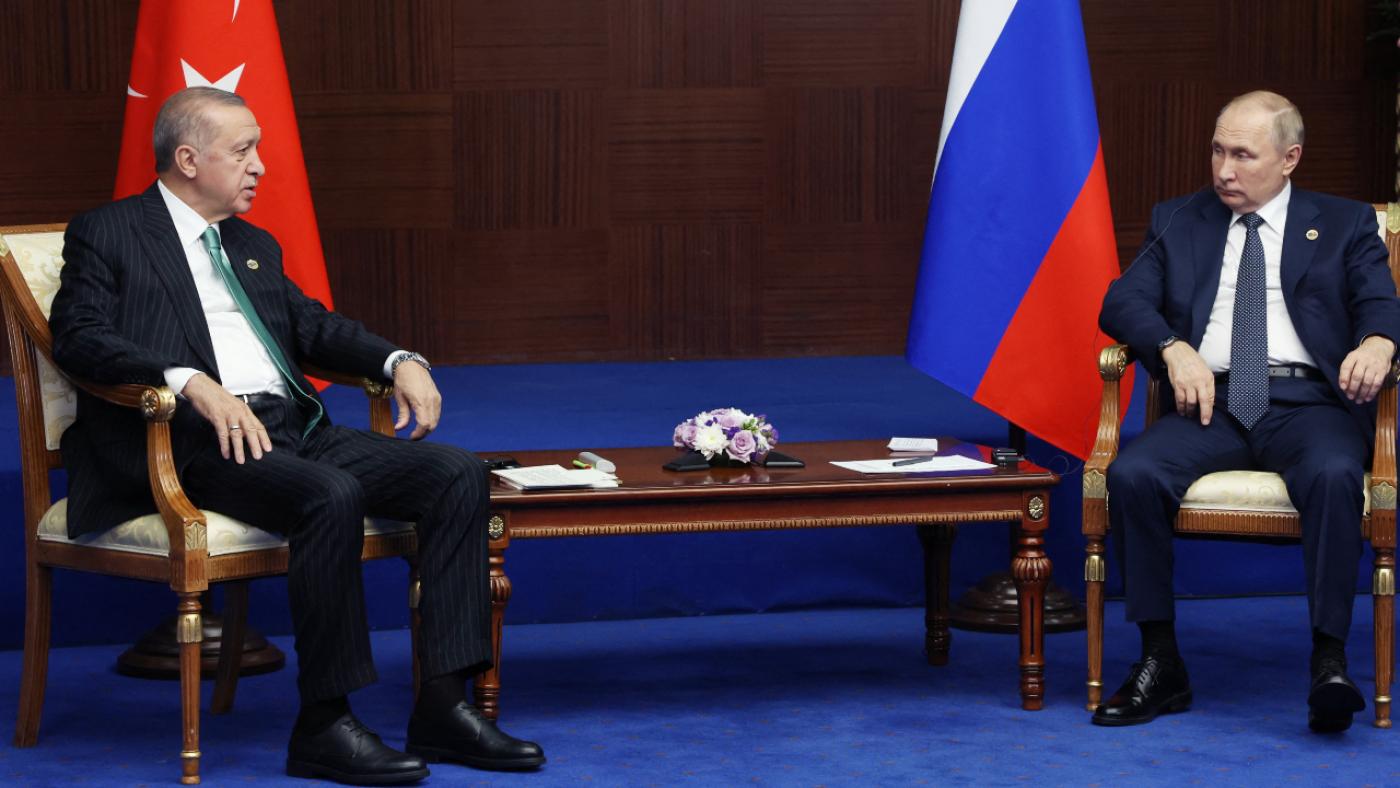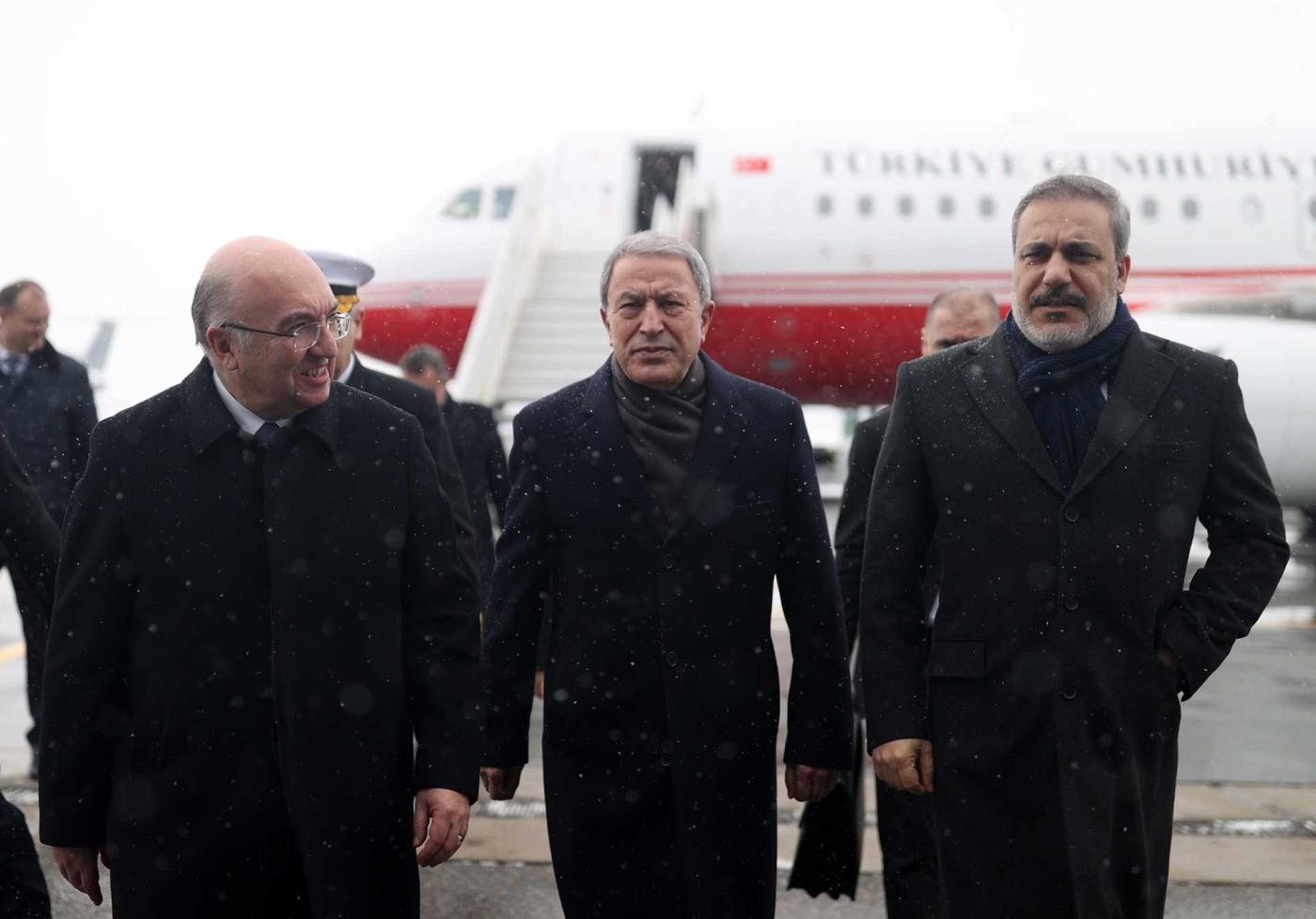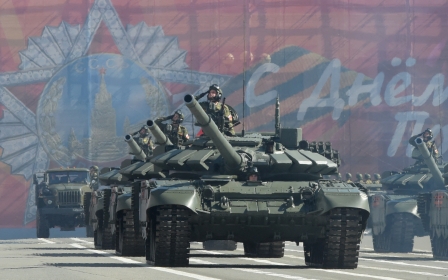Ukraine war: How the Middle East is becoming Russia's economic lifeline

Russia is humming along in the Middle East, pitching arms sales, building nuclear plants, and convening summits, underscoring how one year after the Ukraine invasion, ties to the region have endured - and in some cases expanded - confounding western attempts to isolate the Kremlin.
In Europe, Russia is bogged down and bloodied by an invasion that has left anywhere from 100,00-200,000 of its troops killed or wounded, according to varying western estimates.
Meanwhile, Nato is closing ranks around Kyiv, upping defence supplies to include Leopard 2 tanks and Patriot missiles.
Aided by an unusually warm winter, the European Union is rushing to wean itself off Russian fossil fuels, foiling the Kremlin’s attempts - for now - to weaponise its massive oil and gas resources.
But in the Middle East, the picture is quite different.
New MEE newsletter: Jerusalem Dispatch
Sign up to get the latest insights and analysis on Israel-Palestine, alongside Turkey Unpacked and other MEE newsletters
'Combat tested'
Russian Foreign Minister Sergey Lavrov has been welcomed in Saudi Arabia, Egypt, and the UAE. Even Jordan, which is dependent on the US for aid, received the Kremlin's top diplomat and has continued to praise Russia’s "stabilising" role in Syria.
"While the West continues to see the war in Ukraine as a historical inflection point, it's clear the Middle East sees it as a far-off regional war," Gregory Gause, an expert on Middle Eastern politics at Texas A&M University, told Middle East Eye.
'Saudi Arabia is the now manager and Russia is the co-operator'
- Gregory Gause, Texas A&M University
Cinzia Bianco, a visiting fellow at the European Council on Foreign Relations, says Russia's enduring ties are a case of regional leaders embracing “newfound strategic ambiguity," a move she says they believe will pay off with no obvious end in sight to the war.
On Monday, Russian defence companies pulled out all the stops for a flashy arms show in Abu Dhabi where they displayed "kamikaze drones" like those deployed in Ukraine. They even talked up their battlefield usage as an endorsement.
"Most of the presented products have already been tested in real combat conditions. This is one of the main advantages of Russian weapons over competitors," said Sergey Chemezov, chief of Russia's state-owned Rostec defence conglomerate, according to the company's press service.
In Egypt, Russia's state-owned nuclear company Rosatom is ploughing ahead with the construction of a nuclear power plant.
In addition, the Arab world's most populous country was initially seen as being one of those most vulnerable to the war's fallout due to its links to Russia and its dependence on imports. Between them, Ukraine and Russia had supplied more than 80 percent of Egypt’s wheat imports and Cairo's already perilous finances were immediately hit by rising commodity prices and a drop in tourism.
But if anything Egypt is now more dependent than ever on Russia.
Russian wheat made up 57 percent of the country's total imports in 2022, up from 50 percent in 2021. Unlike Europe, which is reducing its dependence on Russian critical commodities, Cairo is doubling down.
"It's about the prices of course," Egyptian Supply Minister Ali Moselhy said in January. "We buy no matter the origin."
Elsewhere, economic ties are booming as a result of Middle Eastern capitals' refusal to sign up for western sanctions.
'Sanctions proofing'
"The Middle East is serving as a real economic lifeline to Russia," Anna Borshchevskaya, a Russia expert at the Washington Institute for Near East Policy, told MEE.
"It's one reason why Russia's economy has not been hit worse by Western sanctions."
Non-oil trade between the UAE and Russia grew by 57 percent in the first nine months of 2022 – breaking all records - and the UAE Trade Minister Thani bin Ahmed Al-Zeyoudi pledged last December to “push trade to even greater heights".
Meanwhile, wealthy Russians have flocked to Dubai after the 24 February invasion.
The glitzy city-state is now home to everyone from Kremlin-linked oligarchs to draft-dodging tech workers. Russians were the top buyers of real estate in Dubai last year.
In a sign of their growing economic clout, the UAE approved a rare licence for a Russian bank last year.
But the UAE’s growing trade with Russia pales in comparison to that of Nato-member Turkey, where the value of bilateral goods exchanged has surged about 200 percent even as the war rages. Ankara has a particularly voracious appetite for discounted Russian energy.
In a sign of Washington's growing concern at this situation, the White House dispatched a treasury official to both Turkey and the UAE in February this year to pressure them to cut commercial ties with Russia.
'There is a clear decline in interest among GCC countries for Russian military gear'
- Cinzia Bianco, European Council on Foreign Relations
But Bianco from ECFR is doubtful the US will make much headway: "These countries think they can remain in a non-aligned position for a while longer."
She says the war in Ukraine is seen as "a testing ground" for the bigger showdown expected to come between China and the US.
"The war has given the Gulf states a chance to think about sanctions-proofing their systems," she added.
But economic factors are just one element to the enduring ties.
Tables turn on Putin
By extending an open hand to Moscow, Middle Eastern leaders jab at the West.
Riyadh and Abu Dhabi are irritated by what they perceive as the US lecturing them on human rights and Washington's disregard for their security concerns.
This flirtation with the Kremlin happens to come as the Gulf states feel especially confident, their coffers bursting with the windfall from rising oil and gas prices, and both the US and Europe courting them, looking for influence.
"Gulf oil and gas is back at the core of global energy security conversations," Kristian Coates Ulrichsen, a political scientist at Rice University's Baker Institute, told MEE.
"The tables have turned on Putin," Ulrichsen added. "His isolation has been Mohammed Bin Salman's re-entry onto the global stage."
The nature of Russia and Saudi Arabia's relationship has also changed.
The two formed an alliance in 2016 by merging the Saudi-led Organisation of the Petroleum Exporting Countries (Opec) with Russian-dominated crude producers to create Opec+.
"We have a very important partnership with Russia on Opec+," Saudi Foreign Minister Prince Faisal bin Farhan Al-Saud said in Davos, Switzerland, in January. "A partnership that has delivered stability of the oil market… we are going to engage with Russia on that."
But Riyadh may now have the upper hand in this relationship.
'The war has not impacted Russia's ability to achieve its major goals in the Middle East'
- Anna Borshchevskaya, Washington Institute for Near East Policy
"Russia is no longer able to play the kind of independent role in the world oil market that was the basis for Opec+" Gause said.
“Saudi Arabia is now the manager and Russia is the co-operator.”
The war has also shifted the dynamics of Russia’s relationship with Iran.
The two were partners in the Syrian war, where Russian air power combined with Iranian ground proxies to rescue the government of President Bashar al-Assad.
But now, both analysts and diplomats say the two are moving beyond a marriage of convenience in hotspots towards a more ideologically aligned partnership.
Vladimir Putin's first trip outside the former Soviet Union since invading Ukraine was to Iran.
Putin has also promised to accelerate Iran's bid to join the Shanghai Cooperation Organisation (SCO), a central Asian security bloc designed as a counterweight to western influence in Eurasia.
Diplomatic promises aside, analysts say Russia is more dependent on Tehran than the other way around, as Moscow turns to it for armed drones.
"It's really Iran that has gained the most leverage. They are providing Putin with the armaments he needs immediately," Gause said.
But arms sales are the one area where analysts say the war in Ukraine has damaged Russian prospects in the region. MEE reported last year that Russia was facing supply shortages as a result of the war and had to delay servicing clients.
Although the Russian presence at the IDEX arms fair in Abu Dhabi created a media buzz, apart from Iran, which recently agreed to purchase Su-35 fighter jets, Moscow has failed to seal any major new deals.
Egypt backed out of its planned purchase of the same aircraft last year and decided to buy the US F-15 instead.
In addition, Moscow’s poor military performance in Ukraine hasn’t done Russia any favours in the rich Gulf market, Bianco said.
"The lack of quality of Russian weapons systems has been exposed to GCC capitals. There is a clear decline in interest among GCC countries for Russian military gear. They are doubling down on Nato weaponry," she added.
Road to Damascus
But in Syria, where Russia's goal has been to normalise the government of Assad in the eyes of regional rulers, Moscow appears to have the wind at its back.
In March 2022, Assad was welcomed to the UAE for his first trip to an Arab state since the Syrian war began - less than one month after Russia launched its Ukraine invasion.
As Russian forces were being mowed down in a fierce assault on the Ukrainian city of Bakhmut, the Kremlin achieved its long-term objective of brokering talks between the defence and intelligence chiefs of its Syrian ally and Turkey.
More recently, two deadly earthquakes have accelerated a regional push to bring Damascus in from the cold.
Assad's government has received aid packages from Saudi Arabia, and top diplomats from Jordan and the UAE have been welcomed in Damascus.
On Monday, Assad travelled to Oman for only his second trip to an Arab country since the start of the Syrian war 12 years ago.
Borshchevskaya, from the Washington Institute, says one year after the war began in Ukraine, however poorly that conflict is progressing, the Kremlin can look back on its performance in the Middle East with some satisfaction.
"Russia has tried to maintain its gains without incurring costs. By and large, it has been able to do just that," she said.
"The war has not impacted Russia’s ability to achieve its major goals in the Middle East."
This article is available in French on Middle East Eye French edition.
Middle East Eye delivers independent and unrivalled coverage and analysis of the Middle East, North Africa and beyond. To learn more about republishing this content and the associated fees, please fill out this form. More about MEE can be found here.









